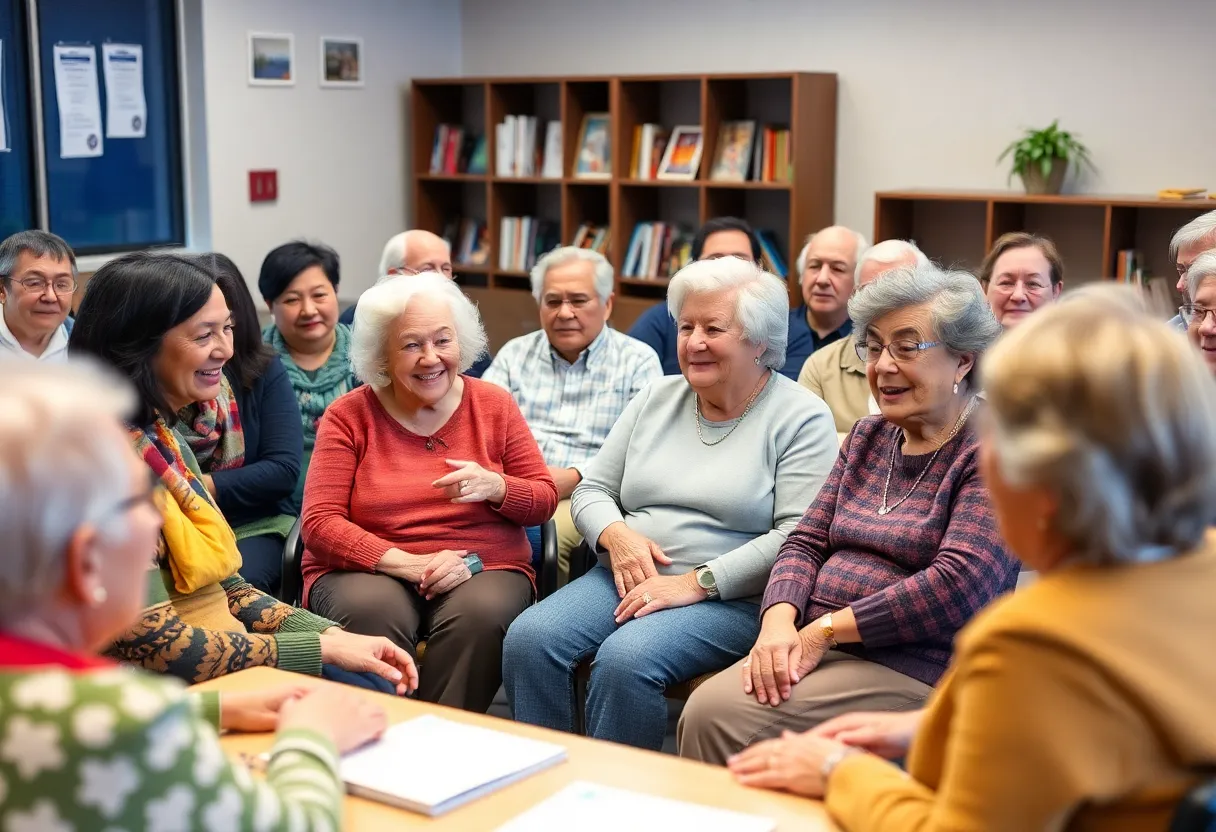Omaha, NE, October 18, 2025
On October 18, local seniors in Omaha took part in Spanish-language classes aimed at raising awareness and prevention of Alzheimer’s disease. Hosted by community health centers, the initiative addressed critical healthcare education gaps for the Hispanic community. Participants engaged in interactive sessions covering symptoms, care strategies, and resources, helping them navigate potential Alzheimer’s risks. The program aims to empower the elderly Hispanic population, supporting ongoing education on Alzheimer’s awareness and culturally sensitive healthcare access.
Omaha Seniors Engage in Spanish-Language Classes on Alzheimer’s Awareness
Omaha, NE – On October 18, 2025, local seniors actively participated in Spanish-language classes designed to raise awareness and promote prevention of Alzheimer’s disease. These sessions, hosted by community health centers, drew a significant number of attendees seeking practical knowledge on managing the condition. The initiative addressed a critical gap in healthcare education for the Hispanic community, focusing on clear explanations of symptoms, daily care strategies, and available support resources.
The classes provided an accessible entry point for participants who might otherwise face language or cultural hurdles in obtaining health information. Attendees found value in the tailored approach, which made complex medical topics easier to grasp. Organizers highlighted the sessions as a vital step toward empowering the growing elderly Hispanic population in Omaha with tools to recognize early signs and adopt preventive measures.
Session Structure and Key Topics Covered
Each class session lasted approximately two hours and included interactive elements to reinforce learning. Facilitators began with an overview of Alzheimer’s symptoms, such as memory loss, confusion, and changes in behavior, emphasizing how these differ from normal aging. Participants engaged in group discussions to share experiences and clarify doubts, fostering a supportive environment.
Care tips formed a core part of the curriculum, covering practical advice like maintaining routines, ensuring medication adherence, and creating safe home environments. Resources discussed included local support groups, diagnostic services, and financial assistance programs available through community networks. The use of Spanish throughout ensured that information resonated without the added stress of translation.
By the end of the sessions, many participants reported feeling more confident in identifying potential risks and seeking timely help. This hands-on format contrasted with traditional one-way lectures, allowing for real-time questions and personalized guidance.
Addressing Cultural Barriers in Healthcare Access
The initiative tackled longstanding challenges in healthcare access for Hispanic seniors, who often encounter barriers like limited bilingual services or cultural stigma around dementia discussions. In Omaha, where the elderly Hispanic population is expanding due to demographic shifts, such programs fill an essential need. Community health centers identified these gaps through prior outreach efforts and designed the classes to build trust and encourage open dialogue.
Attendees appreciated the focus on prevention, which included lifestyle recommendations such as balanced diets, regular physical activity, and social engagement to potentially delay onset. This holistic approach aligned with cultural values emphasizing family involvement in health decisions, making the content particularly relevant.
Future Plans for Ongoing Support
Organizers have committed to expanding these efforts by scheduling monthly events starting next month. Future sessions will build on initial feedback, possibly incorporating guest speakers from medical backgrounds and hands-on demonstrations for care techniques. The goal is to create a sustained network of education that supports not just individuals but entire families affected by Alzheimer’s.
This continuity aims to track participant progress and adapt content as needed, ensuring long-term impact. With Omaha’s diverse population, these recurring classes could serve as a model for similar initiatives in neighboring areas, promoting broader awareness across the region.
Background on Alzheimer’s in the Local Context
Alzheimer’s disease affects millions nationwide, with projections indicating a rise in cases as populations age. In Nebraska, health data shows increasing diagnoses among older adults, particularly in urban centers like Omaha. The Hispanic community faces unique risks, including higher prevalence rates linked to factors like diabetes and cardiovascular issues, which compound cognitive decline.
Community health centers have stepped up in recent years to bridge these disparities, prioritizing preventive education over reactive care. The October 18 sessions mark one of several targeted programs launched in 2025, reflecting a proactive stance amid growing demand. By focusing on Spanish-language delivery, the effort directly counters accessibility issues that have historically limited engagement in health services.
Overall, the event underscored the importance of culturally sensitive education in combating Alzheimer’s. As monthly classes roll out, they promise to equip more seniors with the knowledge to navigate this challenging condition, ultimately enhancing quality of life for participants and their loved ones.
The initiative’s success on October 18 highlights the potential for community-driven solutions to address pressing health needs. With continued support, these classes could significantly reduce the burden of Alzheimer’s through early awareness and informed action.
(Word count: 652)
FAQ
What was the focus of the Spanish-language classes held on October 18, 2025?
The classes focused on Alzheimer’s awareness and prevention, covering symptoms, care tips, and resources for local seniors in Omaha.
Who hosted the sessions for seniors in Omaha?
Community health centers hosted the sessions.
How did attendees respond to the initiative?
Attendees praised the initiative for addressing cultural barriers in healthcare access.
What are the plans for future events related to Alzheimer’s awareness?
Organizers plan monthly events to support the growing Hispanic elderly population in Omaha.
Key Features of the Alzheimer’s Awareness Classes
| Feature | Description |
|---|---|
| Date and Location | October 18, 2025, in Omaha, NE |
| Target Audience | Local seniors, particularly the Hispanic elderly population |
| Language | Spanish-language classes |
| Main Topics | Symptoms, care tips, and resources for Alzheimer’s prevention |
| Host | Community health centers |
| Future Plans | Monthly events to support ongoing awareness |
| Key Benefit | Addresses cultural barriers in healthcare access |


